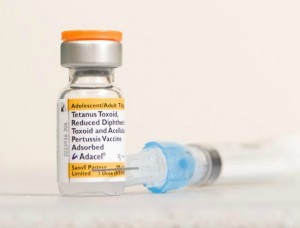Delays in on-time initiation and completion of the pertussis-containing vaccine series remain problematic in the affected communities, facilitating ongoing transmission. Young infants are at greatest risk of severe pertussis infection and its complications.
. The majority of cases (90%) are children aged less than19 years (median age 4 years), of whom 52% were unvaccinated or not up to date with pertussis-containing vaccine.
Infants aged less than1 year account for 34% (37) of cases. Of the 37 mothers of infants with pertussis, only 3 (8%) received the recommended tetanus-diphtheria-acellular pertussis (Tdap) vaccination during their most recent pregnancy. Five infants were hospitalized, including one who had pneumonia.
Recommended strategies to protect these infants include ensuring that the mother receives Tdap during her pregnancy and that the infant starts the vaccine series on time at 2 months of age. Subsequent doses should be given 4, 6 and 15-18 months and at 4-6 years of age.
Pertussis-containing vaccines are required for children to attend child care, head start, pre-kindergarten and both private and public school programs. Providers caring for patients in the Orthodox Jewish communities should recall patients aged 2 months and older and who have not received recommended pertussis containing vaccines for immediate vaccination.
Pertussis is a highly contagious bacterial infection that begins with nonspecific upper respiratory symptoms that last for 7-10 days, followed by onset of cough. The classic pertussis cough includes persistent paroxysms (coughing fits), an inspiratory “whoop”, apnea, and/or post-tussive vomiting. Cough may last weeks to months if not treated early.
People with prior history of disease or vaccination may have milder symptoms and lack classic features of disease, making diagnosis more difficult. Maintain a high level of suspicion of pertussis in all patients with a persistent cough. In infants, apnea can be a prominent feature and complications of pertussis include pneumonia, encephalitis, and death. In adults, complications of pertussis include post-tussive syncope and rib fracture, in addition to persistent cough. Individuals are infectious for up to three weeks or until 5 days after the start of effective antimicrobial treatment.
Related:
- Pertussis alert issued for Brooklyn Orthodox Jewish communities
- Shigella Outbreak Strikes 43 In Brooklyn Jewish Community In Past Month
- More neonatal herpes cases linked to Jewish circumcision reported in New York City
- http://outbreaknewstoday.com/whooping-cough-outbreak-in-orthodox-jewish-areas-of-brooklyn-78282/
